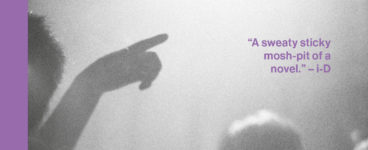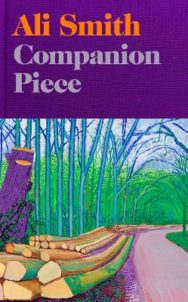‘What I most love about books and reading is that they’re not about how I see myself, they’re always about seeing and going beyond a self’
‘A story is never an answer, a story is always a question,’ according to Companion Piece. Following on from her Seasonable quarter of novels, Ali Smith is back with a brilliant new novel that asks some big questions of living through extraordinary times. To mark publication of her new book, Ali shared some of her definitive reads with BooksfromScotland below.
Companion Piece
By Ali Smith
Published by Hamish Hamilton
The book as . . . memory. What is your first memory of books and reading?
When I was very small, 3, maybe 4 years old, we were on holiday somewhere and we visited a model village in a place called Bourton on the Water. You walked about in what resembled a real village, trees and bridges and buildings and streets, but you were a giant, even if you were 3 or 4 years old. They sold books there in a little kiosk shop about a place visited by a giant called Gulliver, and they sold it in two forms, one for children and one for adults. I could already read, had older siblings and aspired to them. I demanded the one for adults. The lady in the kiosk laughed. ‘My father had a small estate in Nottinghamshire …’ – something of Swift has been in my system since I was lilliputian.
The book as . . . your work. Tell us about your latest book Companion Piece. What did you want to explore in writing this book?
I knew when I’d finished Summer, the last of the books of a quartet I was writing, that partly this book had been tied down formally, obliged to answer some of the demands of its own siblings; I knew viscerally the whole time I was writing it that a quite other book was forming offshore, a parallel book, one that freed itself from all expectations and constraints into something formally and thematically drawn to the place where reality and story meet, and to the freedom (of movement!), the welcome, the mystery, the seduction, the necessity, the natural pull, of fictional truth and the something-sheerly-inarticulable – except in the form of a story – at the core of us all. I think this new book is that book.
The book as . . . inspiration. What is your favourite book that has informed how you see yourself?
What I most love about books and reading is that they’re not about how I see myself, they’re always about seeing and going beyond a self, out of ourselves.
The book as . . . an object. What is your favourite beautiful book?
Anything by Alasdair Gray. Gray let everyone from reader to industry make the book an art object, a thing in itself to hold in the hand and the eye with care and a kind of deep understanding of the worth of book and human both – in the manner of William Blake, who took book tradition and made it visionary.
The book as . . . a relationship. What is your favourite book that bonded you to someone else?
When I first met my partner Sarah she bought me a pile of Classic Penguin E. M. Forster novels. I’d never read him. But! when I did. Light and deep and funny and sharp and merciless and kind. All that long new-love summer I sat on the step at the front door of the rented house I lived in and read them in the sun.
The book as . . . rebellion. What is your favourite book that felt like it revealed a secret truth to you?
Riot Days by Maria Alyokhina, with all its wisdom and determination, is particularly heartening right now while we’re deep in this deadliness of foul Putin territorialising. It means we know the secrets of totalitarian action, and equips its readers against it, much like Nabokov’s Invitation to a Beheading grants extraordinary liberty in the face of such fascism. Also, all translations always feel to me like something is being, and can be, made understood. They cross the borders / mark the shared DNA between different languages and places and people. Anything from elsewhere that reaches translation here in the UK feels like a secret uncovered as well as a publishing achievement against great odds, and my own inability to speak other languages at literature level leaves me flailing and useless and longing on the outside of so many happenings, traditions, innovations. Anything and everything by Albert Camus, especially in translation by Sandra Smith. Actually, anything translated by Sandra Smith. She’s such a good writer. Her recent Simone de Beauvoir translation, Inseparable, a highly rebellious text, led me back to all de Beauvoir’s fiction, which is massively underrated.
And mentioning Camus there reminds me of Jenni Fagan’s writing, which I love. And Jackie Kay’s Trumpet, which unwraps its secrets with such sensuous care. And all the fresh rebellion in Isabel Waidner’s fiction. And and and. Every read is an act of continuity, and of rebellion, against stultification, fixity, mind-stasis.
The book as . . . a destination. What is your favourite book set in a place unknown to you?
Right now it’s any book by Michelle de Kretser. She has always seen all the world’s places from a place that makes them unknown and known simultaneously; I think she’s a really great writer.
The book as . . . the future. What are you looking forward to reading next?
Chitra Ramaswamy’s Homelands, a book about histories, survivals, above all about friendship. And Helen Oyeyemi’s Peaces. Oyeyemi is an original every time. I can’t wait.
Companion Piece by Ali Smith is published by Hamish Hamilton, priced £14.99.
ALSO IN THIS ISSUE

 The Trials of Mary Johnsdaughter
The Trials of Mary Johnsdaughter
‘A hairst sun was dipping in the west, casting a final evening glow through the schoolhouse at Happy …

 The Arena of the Unwell
The Arena of the Unwell
‘Am I paranoid, or are they really after me? I feel like we’re being hunted in here. This song has t …













